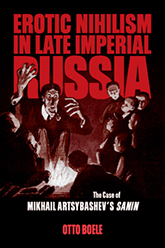|
Erotic Nihilism in Late Imperial Russia
The Case of Mikhail Artsybashev’s Sanin
Otto Boele
“With meticulous scholarship and reasoned arguments, Otto Boele crafts a compelling tale about the realities, the legend, and the memory of a celebrated cultural moment in Russian life under the tsars.”
—Richard Stites, author of Russian Popular Culture: Entertainment and Society since 1900
Banned shortly after its publication in 1907, the Russian novel Sanin scandalized readers with the sexual exploits of its eponymous hero. Wreaking havoc on the fictional town he visits in Mikhail Artsybashev’s story, the character Sanin left an even deeper imprint on the psyche of the real-life Russian public. Soon “Saninism” became the buzzword for the perceived faults of the nation. Seen as promoting a wave of hedonistic, decadent behavior, the novel was suppressed for decades, leaving behind only the rumor of its supposedly epidemic
effect on a vulnerable generation of youth.
Who were the Saninists, and what was their “teaching” all about? Delving into police reports, newspaper clippings, and amateur plays, Otto Boele finds that Russian youth were not at all swept away by the self-indulgent lifestyle of the novel’s hero. In fact, Saninism was more smoke than fire—a figment of the public imagination triggered by anxieties about the revolution of 1905 and the twilight of the Russian empire. The reception of the novel, Boele shows, reflected much deeper worries caused by economic reforms, an increase in social
mobility, and changing attitudes toward sexuality.
Showing how literary criticism interacts with the age-old medium of rumor, Erotic Nihilism in Late Imperial Russia offers a meticulous analysis of the scandal’s coverage in the provincial press and the reactions of young people who appealed to their peers to resist the novel’s nihilistic message. By examining the complex dialogue between readers and writers, children and parents, this study provides fascinating insights into Russian culture on the eve of World War I.
Otto Boele is assistant professor of Russian literature at the University of Leiden, the Netherlands.
Praise
“An original, stimulating, and needed book, based on a rich array of archival and published sources. Situating his work at the nexus of regulation, poetics, rumor, and literary history, Boele carefully examines an important work of literature and its impact on the cultural mythology of its age.”
—Eric Naiman, author of Sex in Public: The Incarnation of Early Soviet Ideology
“An admirable blend of history and literature, showing how the two complement each other.”
—Louise McReynolds, author of Russia at Play: Leisure Activities at the End of the Tsarist Era
“The precision and depth of Boele’s reception study make is an impressive example of the genre, a model of its kind. His approach is distinctive for the thoroughness and insight it brings to a cultural analysis of the text as perceived from two temporal frames.”
—Dale Peterson, Russian Review
“Boele casts a spotlight on a corner of Russian literature that has long remained obscure. His work is not just a major study of Artsybashev, but also a valuable exploration of socio-cultural issues in the Silver Age.”
—Jesse Menefee, Slavic and East European Journal
“Otto Boele uses the critical and popular reception to Sanin as a window onto Russian society in the years immediately preceding the Great War. . . . Boele’s study as a whole debunks what we associate with Saninism, while never losing a sight of the novel’s significance.”
—Laurie Bernstein, Slavic Review
“This is a penetrating, wide-ranging, often entertaining treatment of a fascinating episode.”
—D.B. Johnson, Choice Magazine
“A rewarding revision of Sanin’s distorted critical legacy. . . . An important and useful book.”
—Muireann Maguire, Slavonic and East European Review
“[An] exceptionally well-researched book. . . . Otto Boele’s intelligent and meticulous study of Sanin will help the reader better understand not only the history of sexual discourses in Russia but also the intellectual climate there in the early twentieth century. It is exceptionally rich in new materials, and it features a good deal of insightful and sophisticated analysis.”
—Evgenii Bershtein, Canadian Slavonic Papers
“Using the reception history of Artysbashev’s novel, [Boele] offers a valuable insight into Russia’s literary and non-literary landscape between the revolutions. . . . Scholars looking for a solid and comprehensive cultural analysis of a literary text, particularly of Sanin, will certainly welcome this book.”
—Sandra Evans, Zeitschrift für Slavische Philologie
“A superbly written work making several important contributions to the study of Russian culture.”
—Alexander Sorochan, New Literary Observer
A Mellon Slavic Studies Initiative Book
This book is part of a five-year initiative
for publishing first books by scholars in the fields of Russian, East European, and
Central Asian Studies, supported by the
Andrew W. Mellon Foundation. |
Media & bookseller inquiries regarding review copies, events, and interviews can be directed to the publicity department at publicity@uwpress.wisc.edu or (608) 263-0734. (If you want to examine a book for possible course use, please see our Course Books page. If you want to examine a book for possible rights licensing, please see Rights & Permissions.)
Of Related Interest
Beyond the Flesh
Alexander Blok, Zinaida Gippius, and the Symbolist Sublimation of Sex
Jenifer Presto
Beyond the Flesh shows that although the Russian Symbolist movement was dominated by a concern with transcending sex, many of the writers associated with the movement exhibited an intense preoccupation with matters of the flesh.
|
|

November 2009
LC: 2009013800 PG
274 pp. 6 x 9
8 b/w illus.
|
